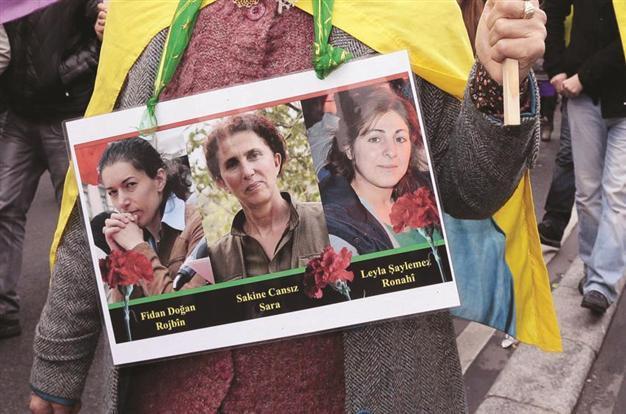Turkish intelligence denies claims over Paris killings but launches internal probe
ANKARA

AFP Photo
The Turkish National Intelligence Organization (MİT) has strictly denied any involvement in the killings of three Kurdish women members of groups affiliated with the outlawed Kurdistan Workers’ Party (PKK) in Paris last year, as suggested by a video recording and in an alleged MİT document. Nonetheless, the organization also announced that it has launched “an administrative investigation” internally, concerning the allegations.
In the last days, through some voice recordings and documents featured in media bodies and social media, the organization is being tried to be linked with the issue of the PKK members who were killed in Paris, the press office of the MİT Undersecretariat said in a written statement released on Jan. 15.
“It is being considered that the said reports are an operation aimed at wearing away our organization which has assumed an active role in the resolution process and aimed at bringing the personnel that has served along this process into a situation in which they cannot perform their duties, by outing them,” the statement said.
A voice recording posted online on Jan. 13 allegedly featuring the voice of Ömer Güney, who stands accused of the killing of the three women, suggested that the order for the murders came from the MİT.
On Jan. 15, a Turkish daily newspaper published a document said to have belonged to MİT. The alleged document says that 6,000 euros were sent to an MİT staff member whose code name is “Legionnaire,” so that he would make preparations for “an operation” targeting Cansız.
“He can be used in rendering the organization member ineffective,” said the alleged document, referring to Legionnaire. The word “organization” refers to the PKK and “rendering ineffective” is a phrase frequently employed by the Turkish Armed Forces (TSK) to describe the killing of PKK militants.
“Our organization has definitely no relation with the murders of Sakine Cansız, Leyla Şaylemez and Fidan Doğan. All the same, the required administrative investigation concerning the claims in question has been launched within our internal structure,” it also said, while underlining that the intelligence organization was fulfilling the duties assigned to it by the Law No: 2937 “within the framework of laws.”
“From now on too, [our organization] will continue its duty with determination within this framework,” the statement concluded.
In late December 2012, Prime Minister Recep Tayyip Erdoğan made public that intelligence agents were meeting with jailed leader of the PKK Abdullah Öcalan, exposing a “resolution/peace” process aimed at ending the three-decade long conflict between Turkey’s security forces and the PKK, in order to pave the way for the resolution of the century-old Kurdish issue.
The road was rocky, however, as seen on Jan. 9, 2013, when Cansız, 55, a founding member of the PKK; Doğan, 32, a spokeswoman for the organization in France and Europe; and a trainee named Şaylemez, 25, were assassinated in Paris. The killings sent a shockwave through Europe’s Kurdish community. On Jan. 17, tens of thousands of people participated in a grand funeral ceremony held in Diyarbakır, a predominantly Kurdish-populated southeastern Anatolia province which has a symbolic importance for Kurds, for the three women. Despite worries of possible provocations and sabotage that would turn the ceremony into a violent protest, such fears did not materialize during the peaceful gathering, during which the women’s coffins were covered with the flags of the PKK.
The Peace and Democracy Party (BDP) Batman deputy Ayla Akat Ata, meanwhile, submitted on Jan. 15 a written motion which contained 10 specific questions about the claims concerning the Paris killings. Ata addressed her questions to Prime Minister Erdoğan.
Ata was among a parliamentary delegation who visited Öcalan on Jan. 3, 2013 when she was accompanied by independent deputy Ahmet Türk. It was the first parliamentary visit paid to Öcalan and was made public as part of the peace process.
